VIIth Heaven: Rekindling the Success of Final Fantasy VII
For years, Final Fantasy games ranked among the most successful examples of the role-playing genre. Although it's debatable whether or not 1997's Final Fantasy VII is the best installment of the series to date, it could safely be considered the most influential.
Design by James Cheung
For years, Final Fantasy games ranked among the most successful examples of the role-playing genre. Although it's debatable whether or not 1997's Final Fantasy VII is the best installment of the series to date, it could safely be considered the most influential. Its launch on the PlayStation ushered in the cinematic era of video games and convinced gamers that the stories told through this medium could be incredibly poignant.
Since then, the Final Fantasy series has aspired to even greater heights, but part VII is the game that many longtime fans hold nearest and dearest to their hearts--as evidenced by Square Enix's recent decision to produce a series of spin-offs set in the Final Fantasy VII universe. There are currently several new properties based on Final Fantasy VII coming down the pipeline, including the full-length feature movie Advent Children, as well as three completely new games on three different platforms. The next step is obvious: a full-scale remake of Final Fantasy VII, using modern, cutting-edge technology. Square Enix teased the prospect of such a game at this year's Electronic Entertainment Expo but insisted that the Final Fantasy VII-based technology demonstrated was not meant to indicate that an actual game was in development.
Anything is possible, though. The tease, in the form of the tech demo that showcased the PS3 at this year's E3, signifies how much staying power the Final Fantasy VII name still has, even eight years after its original release. Furthermore, because it's arguably one of the greatest role-playing games of all time, all it would need is a fresh coat of paint to recapture the imaginations of millions of game players worldwide...right?
Re-creating the magic and appeal of Final Fantasy VII may prove to be more challenging than that. Final Fantasy VII defined a style of gaming that has continued to evolve--if slowly--since the game's release. In the wake of the original Final Fantasy VII, a remake would still stand in the shadow of its illustrious predecessor. So, should a remake of the game simply try to update Final Fantasy VII's visuals to modern standards? Or should it aspire to have the same significant impact as the original did in its time? What--if anything--would it take for a remake of Final Fantasy VII to be as successful as its predecessor?
To attempt to answer this question, we took a look back at our original review of Final Fantasy VII and considered the changes that would be necessary to create a new game worthy of such a pedigree. We factored in the improved standards among games in general, as well as within the Final Fantasy series in particular. We also noted time-sensitive factors that played such a big part in the original. Join us as we examine just how much of a daunting task it would be to make a new Final Fantasy VII live up to its namesake.
Gameplay
From the original review:
"If you were to strip away the story, scenery, and musical score, Final Fantasy VII would otherwise be very much like any other Japanese RPG you've ever played. You still must face countless random monster encounters while keeping a close eye on your hit points and magic points, and you will witness your characters grow stronger with every experience level they attain."
Final Fantasy VII emphasized story and production, but its gameplay was not particularly stronger than other console RPGs of the same era, or even earlier games in the Final Fantasy series. Random monster encounters were plentiful to the point of being excessive, and due to its difficulty, a certain amount of tedious grinding was required in order to progress. Fans of Final Fantasy would probably agree that this was a little much, even the first time around.
It wasn't to the game's detriment that it lasted anywhere from 40 to 100 hours, depending on how much you were trying to complete; but when length comes at the hands of tedium, then it becomes more of a contrivance than a bonus. In a remake, you shouldn't be made to go through that much busywork to uncover the next major plot point. It wouldn't require removing that much gameplay to make Final Fantasy VII more accessible, but it seems almost necessary, especially since players revisiting the game will be less motivated to put themselves through that much duress again. Another factor in the length of the original was significant load times, particularly during the summon sequences. Playing through Final Fantasy VII several times and having to sit through the full spells of Knights of the Round and Meteor is a serious time investment.
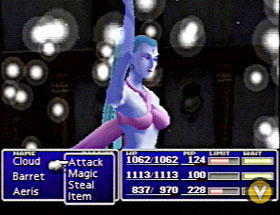
Additionally, many of the processes in the Final Fantasy games have been refined since VII's release. Without abandoning or altering the gameplay mechanics, Final Fantasy VII's remake would surely have to adopt the more sophisticated inventory management of the latest games. For example, IX introduced an optimization button that would automatically equip you with optimal gear. This and other menu tweaks helped make the series easier to play, without necessarily disrupting the gameplay. An updated version should take advantage of all of the refinements made to the series since the original release.
Graphics
From the original review:
"This is the most dazzling visual experience to date on any console. Film-quality computer-generated cinematics blend seamlessly with pre-rendered background artwork to create the strikingly realistic world of Final Fantasy VII, both beautiful in its grandeur and terrifying in its detail."
At the time, the graphics in Final Fantasy VII were so completely superior to anything we had previously seen on consoles that it's hard to even imagine what a remake would have to look like to replicate that experience. The tech demo from E3 was graphically impressive, but not necessarily better looking than anything else being made for the PS3--and certainly not as dazzling as Final Fantasy VII first was, in 1997. If the remake of Final Fantasy VII were done in photo-realism, then we might approach the drastic graphical improvement achieved by the original game.
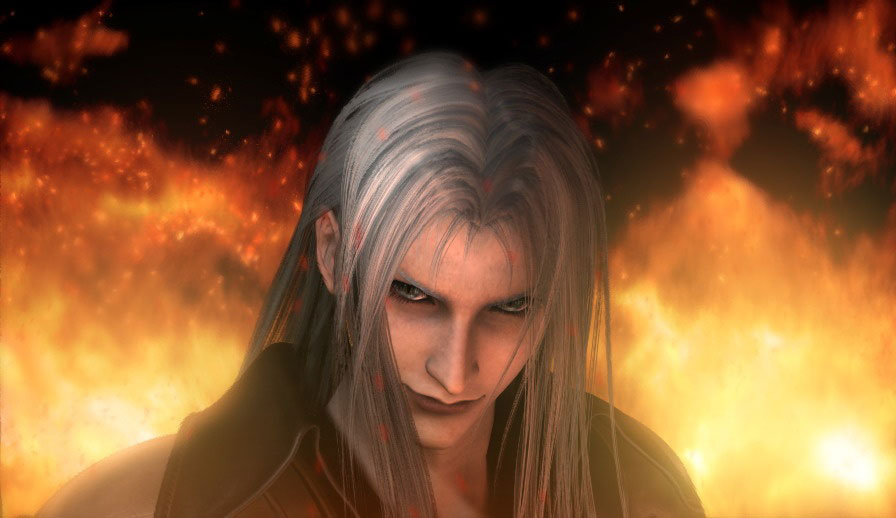
A danger of graphical updates, especially when the source material is both relatively primitive and cartoonish, is that making the move over to realism might change the characters too drastically. For example, Advent Children, which is essentially a graphical update to Final Fantasy VII, takes a new twist on the appearance of Sephiroth. Instead of being merely a more realistic version of the rugged-looking Sephiroth from the original, the Advent version of Sephiroth seems to have a bit of the twisted Final Fantasy VI villain, Kefka, in him. His smile is sneering and clownish, and his whole appearance seems slightly more effeminate. While creatively adapting the characters to the new visual format is important, too much of a change might alienate longtime fans of the series. For a remake, it would be essential to make the game as beautiful as possible, without altering appearances too much.
Sound
From the original review:
"Meanwhile, a masterfully orchestrated soundtrack - courtesy of veteran composer Nobuo Uematsu - is a major force behind the intense emotion of Final Fantasy VII. The synthesized musical score hearkens Final Fantasy's golden age on the Super Nintendo, consciously staying true to its roots."
The music from Final Fantasy VII was both plentiful and memorable. Characteristic of composer Nobuo Uematsu, it incorporated the long-running heritage of Final Fantasy music into more than 80 completely unique tracks. However, in the years since, the music in games--even Final Fantasy music--has matured. It's arguable whether Uematsu has ever relived the simple genius of his compositions for the SNES games in the series, but regardless, he has taken steps to ensure that the music has progressed in some ways over the years. One such step is the formation of Dear Friends. Taking a few of the MIDI songs from each of the games in the Final Fantasy series, Uematsu rewrote and had them performed by a full symphony orchestra. For a remake of Final Fantasy VII, we would expect no less than to hear the entire soundtrack done this way (the one exception being the battle tracks that Uematsu's rock band, The Black Mages, performs).
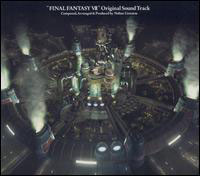
The other convention that has been established for Final Fantasy games in the years since its original release pertains to voice-overs. In the past, game players have sacrificed the ability to name all of the characters and have received, in return, fully voiced games. Again, the problem that arises is one of expectation. The original game was silent, and players had to use their imagination to give life to the characters. A remake might implement a voice that is incongruent with fans' conceptions of the characters. It's difficult to imagine casting a perfectly suited actor--one with whom all players would be satisfied--to voice Cloud Strife, for example. However, the alternative--to keep the characters unvoiced--seems like too big of a step backward for the series. So it's essential for Square Enix to make careful selections with its voice actors for a possible remake, putting as much effort into it as it did with the voices in Final Fantasy X or the Kingdom Hearts series.
Value
From the original review:
"Some have gone as far as to call Final Fantasy VII the hands-down best game ever made. And if you enjoy a good Japanese-style RPG, chances are you will agree. However, Final Fantasy VII, for all its astonishing features, is not a game with the sort of mass appeal that its massive marketing blitz may lead you to believe."
Remaking games is a tricky business, but one that is occurring more frequently these days. Some games are more conducive to being remade than others. While enjoying a remake may depend entirely on the person playing it and their relationship to the series, it seems as though there are still guidelines that "remakers" need to follow to best position their game for success.
Metal Gear Solid: Twin Snakes (the GameCube port of the original Metal Gear Solid) is an example of how to re-create a great game too accurately. Because there weren't enough changes to the structure and gameplay of Metal Gear Solid, audiences were given a game that didn't feel nearly as good as it looked. Graphical updates without gameplay enhancements make for pretty but shallow gaming experiences. Conversely, the remake of Resident Evil seemed to perfectly integrate the original game, while making just enough changes to keep people familiar with the series on their toes. A remake of Final Fantasy VII shouldn't be identical to the original, but Square Enix needs to make sure that it doesn't change anything that fans would otherwise miss.
Tilt
From the original review:
"Truly the best aspect of Final Fantasy VII is the plot that these peerless aesthetics help weave. Join the enigmatic mercenary Cloud Strife in a journey that will take him to the very source of his being in an incredible quest where the fate of the world hangs by a precious thread, threatening at any instant to be torn by the charismatic, tormented villain of the story."
Much of Final Fantasy's staying power can be attributed to the story, not only because it was rich compared to other video game treatments at the time, but also because it was surprising. These days, stories have exponentially grown more intricate, from the detailed and often overly complex Metal Gear plots to the quiet narratives of games like Ico. Games that rely solely on linear narratives as their draw suffer most in terms of replay value. For example, the particular moment that stands out in Final Fantasy VII is the death of Aeris. Not only was it innovative and shocking to kill off a main character halfway through, but it is one of the most frequently cited moments connected with the concept of plot spoilers. What if you had gone into Final Fantasy VII knowing that Aeris was going to die? The game's powerful story would have certainly been diminished.
Knowing that Aeris is going to die certainly takes away from the plot, and it would be quite interesting, on one hand, to completely surprise audiences by killing off someone else, but it wouldn't make sense within the context of the intricately woven story. So it becomes unlikely that the story would be as compelling in a remake, since nothing can be quite surprising about it. That's not to say that it wouldn't be enjoyable, because living through Final Fantasy VII's story again is precisely the reason that many people are calling for a remake. However, changes could be made to make the story richer and slightly different for people already familiar with it. What if players had the opportunity to play through sequences that weren't originally in the game, or were originally unplayable? Fleshing out side quests or alternating the main character in sections would certainly add life to the game without alienating its fan base.
Conclusion
In some respects, remaking a beloved, classic game is a difficult task. In other respects, it's an easy one, because so much of the work has already been finished. Like many who appreciate Final Fantasy VII, we'd like to see a remake of the game only if Square Enix is prepared to remake it properly. If not, there are enough upcoming Final Fantasies, both new properties and those based on the VII license, to keep us occupied for quite some time.
Discuss whether you think Final Fantasy VII should be remade or not on our forums.
Got a news tip or want to contact us directly? Email news@gamespot.com
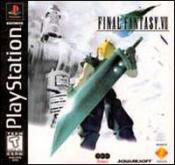





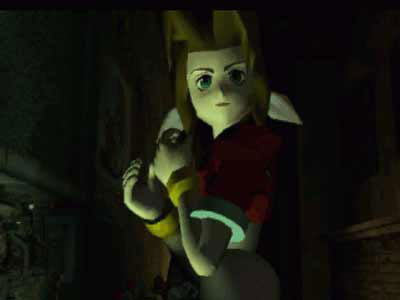
Join the conversation